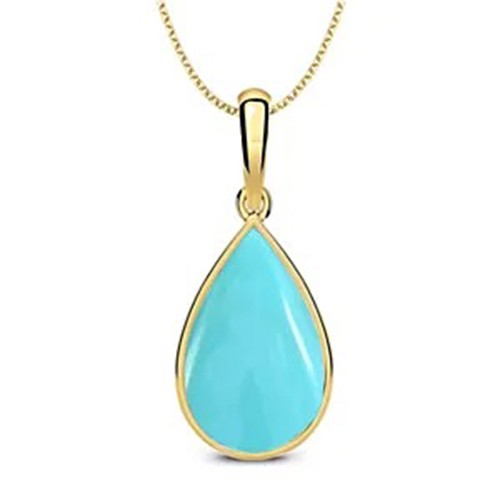Iranian Turquoise (Irani Feroza) Locket
Iranian Turquoise (Irani Feroza) Locket
2100
4100
Iranian Turquoise (Irani Feroza)
Iranian Turquoise, also known as Persian Turquoise is a brilliant sky blue-hued variety of Turquoise, sourced from the mines of Iran. Irani Feroza helps in physical strengthening and overcomes inhibitions.
- 5.25 ratti
- 6.25 ratti
- 7.25 ratti
- 9.25 ratti
- 10.25 ratti
About Turquoise
Turquoise stones are blue and green phosphate minerals celebrated for their soothing energy and oceanic beauty. People have coveted turquoise jewelry for thousands of years. Whether you’re a fan of rings, pendants, beads, or necklaces, turquoise is sure to be a stunning pick!
If you or a loved one has a birthday in December, you can happily claim turquoise as your birthstone! Turquoise’s cool blue tones are a fantastic match for any winter babies out there.
Likewise, if your zodiac sign is Sagittarius or Capricorn, turquoise is the perfect stone for you. For the ambitious and enthusiastic Sagittarius, turquoise can help you achieve prosperity. For the strong yet often stubborn Capricorn, turquoise can help you foster more open communication.
Let’s get scientific for a hot second! Turquoise is a hydrated phosphate full of copper and aluminum. That means that if you dunk turquoise in water, it’ll absorb the liquid.
As a porous mineral, turquoise teeters between 5-6 on the Mohs scale of mineral hardness just below quartz. As a comparison to everyday objects, turquoise is softer than a steel nail!
Turquoise Specifications and Characteristics
-
Color: Turquoise, pale to dark blue, blue-green, yellow
-
Crystal structure: Triclinic
-
Luster: Vitreous (crystals), waxy or dull (massive)
-
Transparency: Transparent to translucent (rare), opaque
-
Refractive index: 1.590-1.650
-
Specific gravity: 2.40-2.90
-
Cleavage: None (massive)
urquoise Stone Meaning
The name turquoise stems from the 17th century through the French word turquois, or “Turkish.” After all, Turkish travelers first introduced medieval Europe to turquoise stones from Persian mines.
Is turquoise a lucky stone? You bet! As a popular symbol of good luck, turquoise can bring you success and fortune. The next time you’re pursuing that promotion at work, carry some turquoise for an extra shot of luck.
Along with good luck, turquoise represents hope and serenity as well. Try decorating your home or office with this sky-blue stone to reap some well-deserved peace and happiness. You can even meditate with your turquoise stone, whether by itself or in a crystal grid.
Finally, turquoise symbolism offers protection against danger, particularly your personal health. According to popular beliefs, if your turquoise stone breaks, consider this a warning of danger! If your gem pales in color, you may fall ill soon. Meanwhile, a total loss of color can indicate the owner’s death — but of course, this is part of the stone’s lore and legend.
Turquoise Healing Properties
Like most gems, turquoise can double as a powerful healing stone. So, what are the benefits of turquoise stones?
Turquoise Physical Healing
-
Strengthens immune system
-
Absorbs nutrients
-
Regenerates damaged tissue
-
Heals eyes and sore throats
-
Alleviates body pain
Turquoise Emotional Healing
-
Combats depression and fatigue
-
Prevents panic attacks
-
Promotes inner harmony
Turquoise Spiritual Healing
-
Improves self-realization
-
Activates the heart, throat, and third-eye chakras
-
Stabilizes the lower chakras
What are the chakras, anyway? Chakras are sacred energy centers that flow from the crown of your head to the base of your spine.
The heart chakra is the center of your love, compassion, and empathy. The throat chakra controls your ability to communicate and express yourself. Finally, the third-eye chakra unlocks your intuition and foresight.
When your chakras are blocked, you can suffer physical and spiritual pain. Fortunately, turquoise stones can open these chakras and heal you inside and out.
Turquoise Gemstone Properties
When you shop for quality turquoise jewelry, you’ll want to assess these gemstone properties:
-
Color. Turquoise colors range from turquoise to blue to even sometimes yellow. Turquoise receives its blue shades from copper, green from chromium and vanadium and yellow from iron. If you’re a fan of matrix patterns, consider getting a spiderweb turquoise stone with a lace-patterned black matrix!
-
Carat Weight. Turquoise gemstones are often sold commercially at around 4-8 carats. Larger jewels work great as ornamental pieces.
-
Clarity. Most turquoise stones are opaque — they’re matte with colorful spider web-like inclusions called matrixes. Turquoise matrix patterns are breathtakingly beautiful and range from black to gold.
-
Cut. Gem-quality turquoise gems are typically carved into cabochons, inlay, and carvings. Lower-grade stones are fashioned into beads, whether they’re polished or “nugget-style.”
It is a long established fact that a reader will be distracted by the readable content of a page when looking at its layout. The point of using Lorem Ipsum is that it has a more-or-less normal distribution of letters, as opposed to using 'Content here, content here', making it look like readable English. Many desktop publishing packages and web page editors now use Lorem Ipsum as their default model text, and a search for 'lorem ipsum' will uncover many web sites still in their infancy. Various versions have evolved over the years, sometimes by accident, sometimes on purpose.
There are many variations of passages of Lorem Ipsum available, but the majority have suffered alteration in some form, by injected humour, or randomised words which don't look even slightly believable.
Review
There are no review yet
Add A Review
Your email address will not be published.






